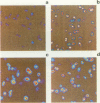Abstract
Methoxymorpholinyl doxorubicin (MMDX) is a novel anti-cancer anthracycline that differs from doxorubicin in its mechanisms of action, pattern of resistance and metabolism. Whereas doxorubicin is primarily an inhibitor of topoisomerase II, MMDX inhibits both topoisomerases I and II, resulting in predominantly single-strand DNA cleavage and, to a lesser extent, double-strand DNA breakage. MMDX is equally cytotoxic in vitro against the doxorubicin-sensitive and -resistant uterine sarcoma cell lines, MES-SA and Dx5. Using fluorescent laser cytometry, MMDX was retained intracellularly to a similar extent in MES-SA and Dx5; the intracellular retention of MMDX was 7.5-fold higher than that of doxorubicin in Dx5. The cytotoxicity of MMDX on an ovarian carcinoma cell line, ES-2, was potentiated 50-fold by preincubating the drug with human liver microsomes and NADPH. This cytotoxic potentiation was associated with the appearance of DNA interstrand cross-links. The in vitro potentiation of MMDX was inhibited by cyclosporin A, which is a substrate for human cytochrome P450 IIIA.
Full text
PDF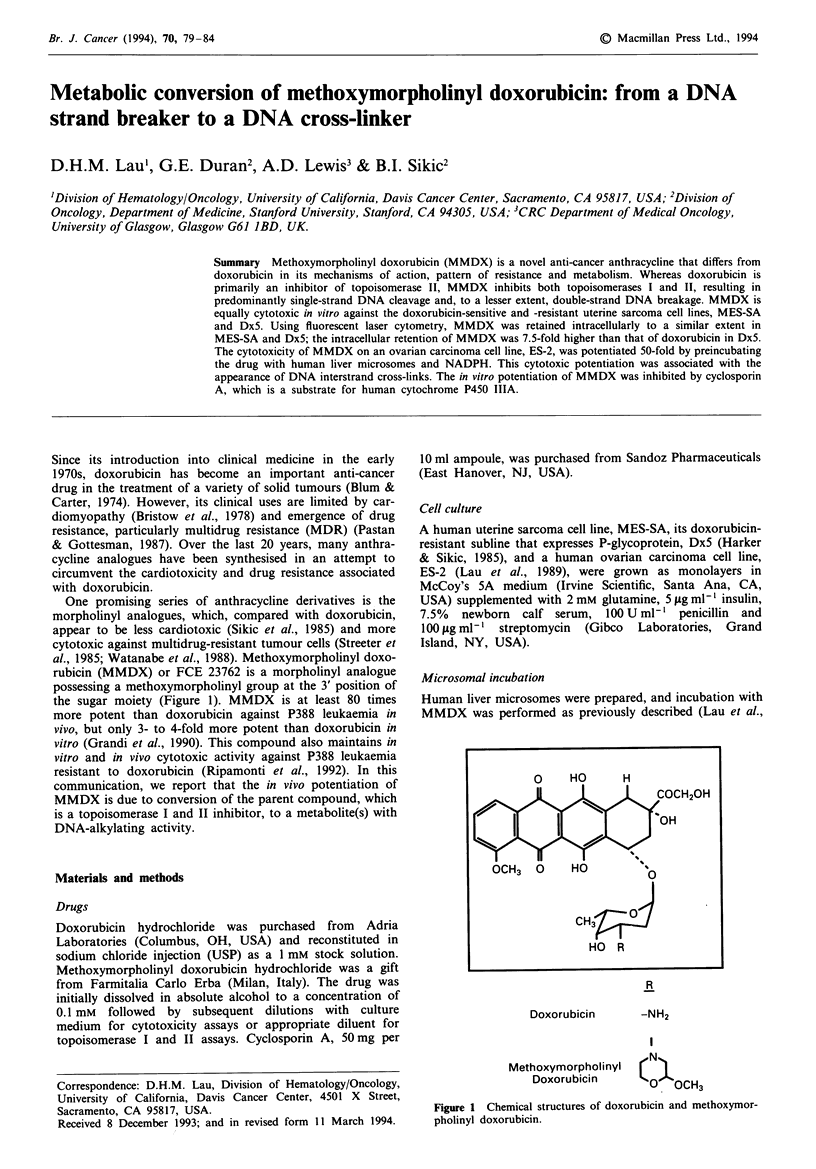
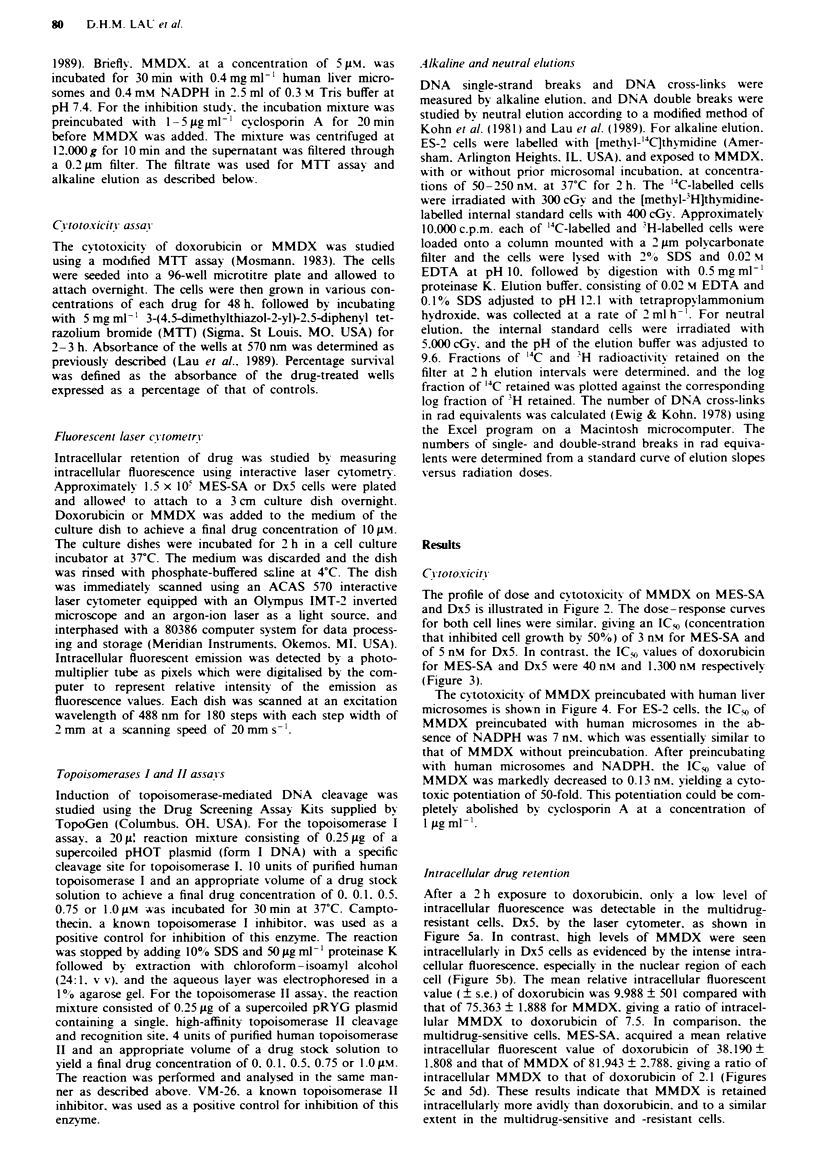
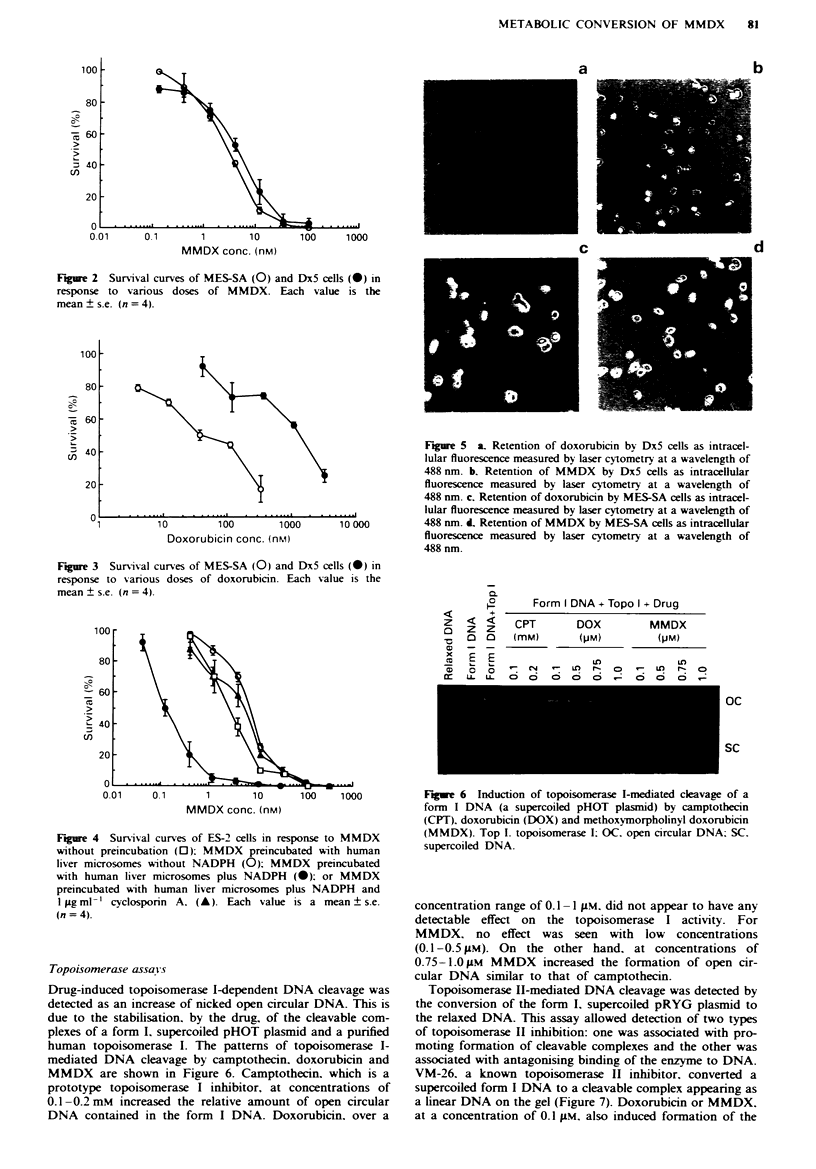
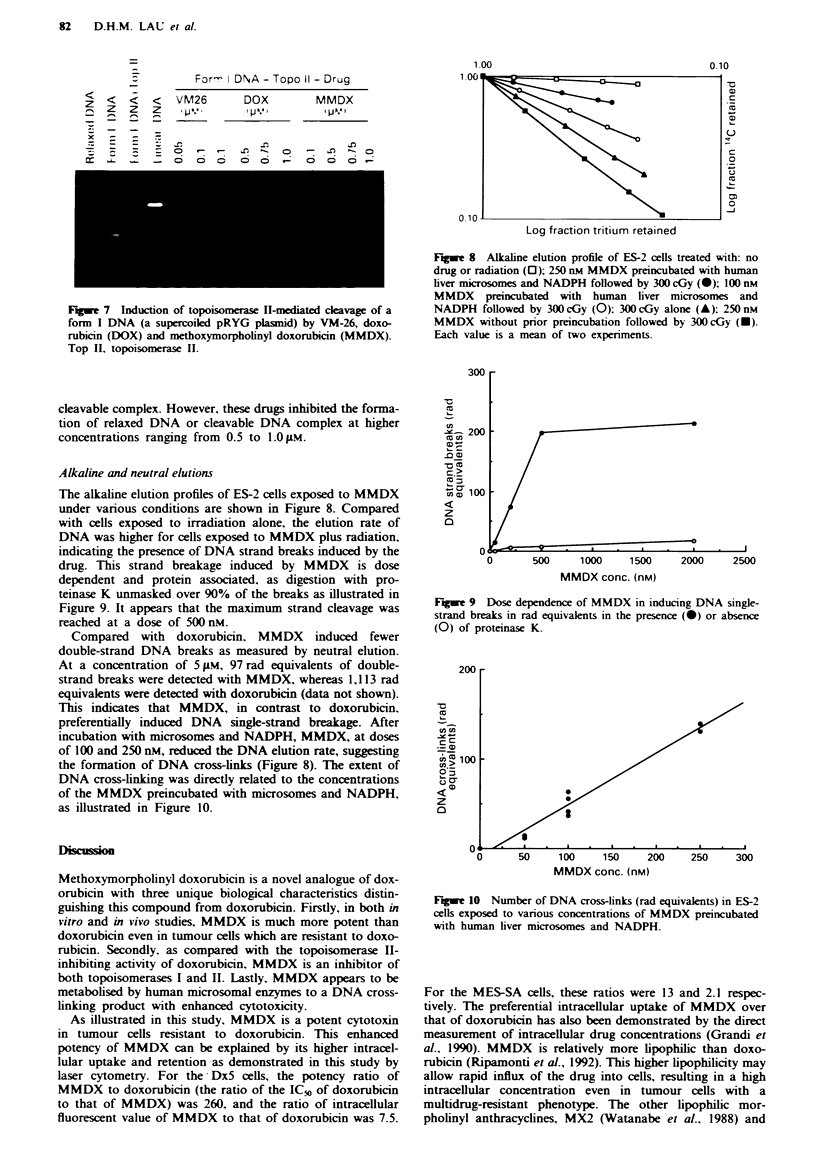
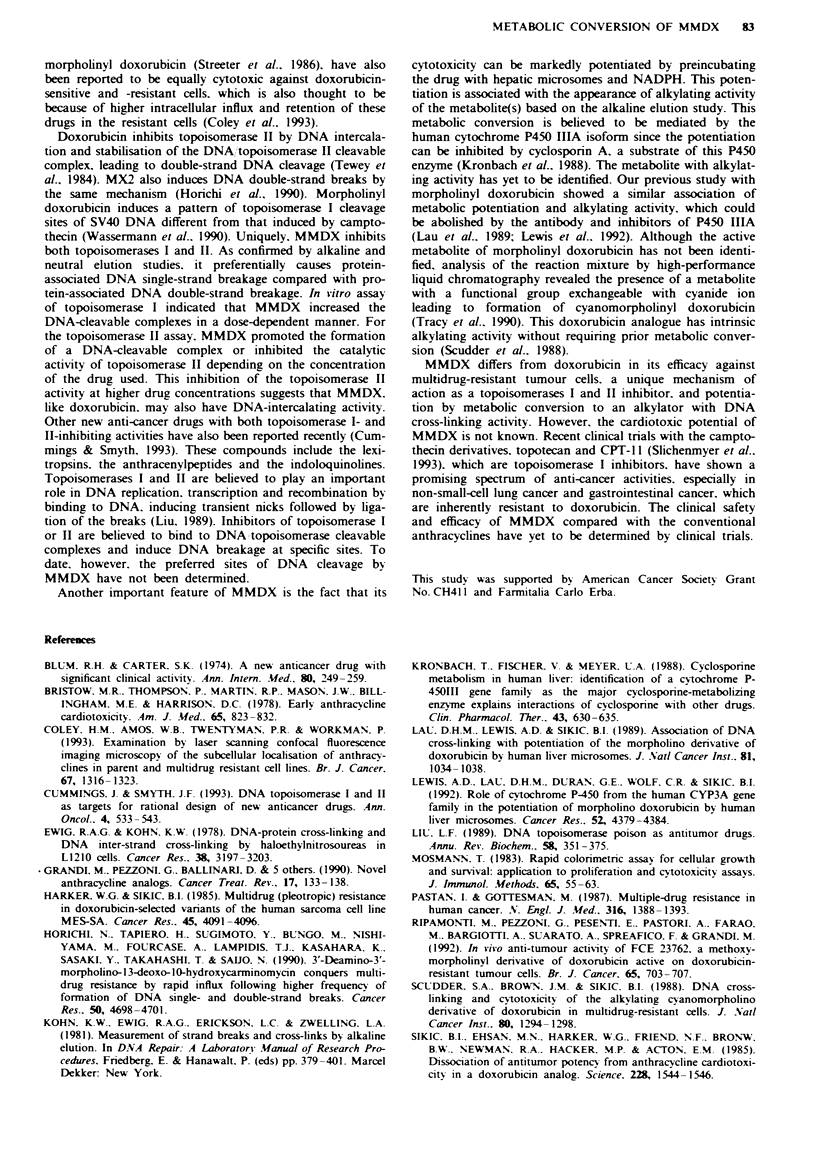
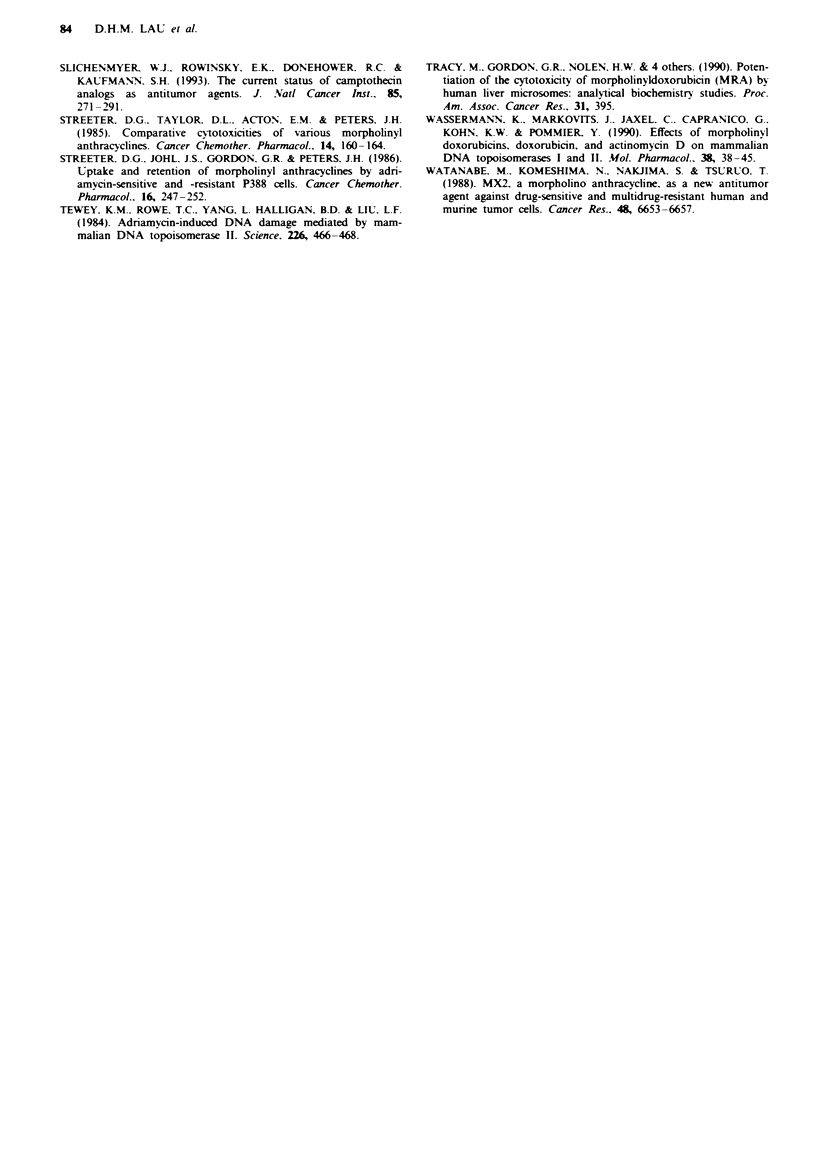
Images in this article
Selected References
These references are in PubMed. This may not be the complete list of references from this article.
- Blum R. H., Carter S. K. Adriamycin. A new anticancer drug with significant clinical activity. Ann Intern Med. 1974 Feb;80(2):249–259. doi: 10.7326/0003-4819-80-2-249. [DOI] [PubMed] [Google Scholar]
- Bristow M. R., Thompson P. D., Martin R. P., Mason J. W., Billingham M. E., Harrison D. C. Early anthracycline cardiotoxicity. Am J Med. 1978 Nov;65(5):823–832. doi: 10.1016/0002-9343(78)90802-1. [DOI] [PubMed] [Google Scholar]
- Coley H. M., Amos W. B., Twentyman P. R., Workman P. Examination by laser scanning confocal fluorescence imaging microscopy of the subcellular localisation of anthracyclines in parent and multidrug resistant cell lines. Br J Cancer. 1993 Jun;67(6):1316–1323. doi: 10.1038/bjc.1993.244. [DOI] [PMC free article] [PubMed] [Google Scholar]
- Cummings J., Smyth J. F. DNA topoisomerase I and II as targets for rational design of new anticancer drugs. Ann Oncol. 1993 Aug;4(7):533–543. doi: 10.1093/oxfordjournals.annonc.a058584. [DOI] [PubMed] [Google Scholar]
- Grandi M., Pezzoni G., Ballinari D., Capolongo L., Suarato A., Bargiotti A., Faiardi D., Spreafico F. Novel anthracycline analogs. Cancer Treat Rev. 1990 Sep;17(2-3):133–138. doi: 10.1016/0305-7372(90)90037-g. [DOI] [PubMed] [Google Scholar]
- Harker W. G., Sikic B. I. Multidrug (pleiotropic) resistance in doxorubicin-selected variants of the human sarcoma cell line MES-SA. Cancer Res. 1985 Sep;45(9):4091–4096. [PubMed] [Google Scholar]
- Horichi N., Tapiero H., Sugimoto Y., Bungo M., Nishiyama M., Fourcade A., Lampidis T. J., Kasahara K., Sasaki Y., Takahashi T. 3'-Deamino-3'-morpholino-13-deoxo-10-hydroxycarminomycin conquers multidrug resistance by rapid influx following higher frequency of formation of DNA single- and double-strand breaks. Cancer Res. 1990 Aug 1;50(15):4698–4701. [PubMed] [Google Scholar]
- Kronbach T., Fischer V., Meyer U. A. Cyclosporine metabolism in human liver: identification of a cytochrome P-450III gene family as the major cyclosporine-metabolizing enzyme explains interactions of cyclosporine with other drugs. Clin Pharmacol Ther. 1988 Jun;43(6):630–635. doi: 10.1038/clpt.1988.87. [DOI] [PubMed] [Google Scholar]
- Lau D. H., Lewis A. D., Sikic B. I. Association of DNA cross-linking with potentiation of the morpholino derivative of doxorubicin by human liver microsomes. J Natl Cancer Inst. 1989 Jul 5;81(13):1034–1038. doi: 10.1093/jnci/81.13.1034. [DOI] [PubMed] [Google Scholar]
- Lewis A. D., Lau D. H., Durán G. E., Wolf C. R., Sikic B. I. Role of cytochrome P-450 from the human CYP3A gene family in the potentiation of morpholino doxorubicin by human liver microsomes. Cancer Res. 1992 Aug 15;52(16):4379–4384. [PubMed] [Google Scholar]
- Liu L. F. DNA topoisomerase poisons as antitumor drugs. Annu Rev Biochem. 1989;58:351–375. doi: 10.1146/annurev.bi.58.070189.002031. [DOI] [PubMed] [Google Scholar]
- Mosmann T. Rapid colorimetric assay for cellular growth and survival: application to proliferation and cytotoxicity assays. J Immunol Methods. 1983 Dec 16;65(1-2):55–63. doi: 10.1016/0022-1759(83)90303-4. [DOI] [PubMed] [Google Scholar]
- Pastan I., Gottesman M. Multiple-drug resistance in human cancer. N Engl J Med. 1987 May 28;316(22):1388–1393. doi: 10.1056/NEJM198705283162207. [DOI] [PubMed] [Google Scholar]
- Ripamonti M., Pezzoni G., Pesenti E., Pastori A., Farao M., Bargiotti A., Suarato A., Spreafico F., Grandi M. In vivo anti-tumour activity of FCE 23762, a methoxymorpholinyl derivative of doxorubicin active on doxorubicin-resistant tumour cells. Br J Cancer. 1992 May;65(5):703–707. doi: 10.1038/bjc.1992.148. [DOI] [PMC free article] [PubMed] [Google Scholar]
- Scudder S. A., Brown J. M., Sikic B. I. DNA cross-linking and cytotoxicity of the alkylating cyanomorpholino derivative of doxorubicin in multidrug-resistant cells. J Natl Cancer Inst. 1988 Oct 19;80(16):1294–1298. doi: 10.1093/jnci/80.16.1294. [DOI] [PubMed] [Google Scholar]
- Sikic B. I., Ehsan M. N., Harker W. G., Friend N. F., Brown B. W., Newman R. A., Hacker M. P., Acton E. M. Dissociation of antitumor potency from anthracycline cardiotoxicity in a doxorubicin analog. Science. 1985 Jun 28;228(4707):1544–1546. doi: 10.1126/science.4012308. [DOI] [PubMed] [Google Scholar]
- Slichenmyer W. J., Rowinsky E. K., Donehower R. C., Kaufmann S. H. The current status of camptothecin analogues as antitumor agents. J Natl Cancer Inst. 1993 Feb 17;85(4):271–291. doi: 10.1093/jnci/85.4.271. [DOI] [PubMed] [Google Scholar]
- Streeter D. G., Johl J. S., Gordon G. R., Peters J. H. Uptake and retention of morpholinyl anthracyclines by adriamycin-sensitive and -resistant P388 cells. Cancer Chemother Pharmacol. 1986;16(3):247–252. doi: 10.1007/BF00293986. [DOI] [PubMed] [Google Scholar]
- Streeter D. G., Taylor D. L., Acton E. M., Peters J. H. Comparative cytotoxicities of various morpholinyl anthracyclines. Cancer Chemother Pharmacol. 1985;14(2):160–164. doi: 10.1007/BF00434357. [DOI] [PubMed] [Google Scholar]
- Tewey K. M., Rowe T. C., Yang L., Halligan B. D., Liu L. F. Adriamycin-induced DNA damage mediated by mammalian DNA topoisomerase II. Science. 1984 Oct 26;226(4673):466–468. doi: 10.1126/science.6093249. [DOI] [PubMed] [Google Scholar]
- Wassermann K., Markovits J., Jaxel C., Capranico G., Kohn K. W., Pommier Y. Effects of morpholinyl doxorubicins, doxorubicin, and actinomycin D on mammalian DNA topoisomerases I and II. Mol Pharmacol. 1990 Jul;38(1):38–45. [PubMed] [Google Scholar]
- Watanabe M., Komeshima N., Nakajima S., Tsuruo T. MX2, a morpholino anthracycline, as a new antitumor agent against drug-sensitive and multidrug-resistant human and murine tumor cells. Cancer Res. 1988 Dec 1;48(23):6653–6657. [PubMed] [Google Scholar]



